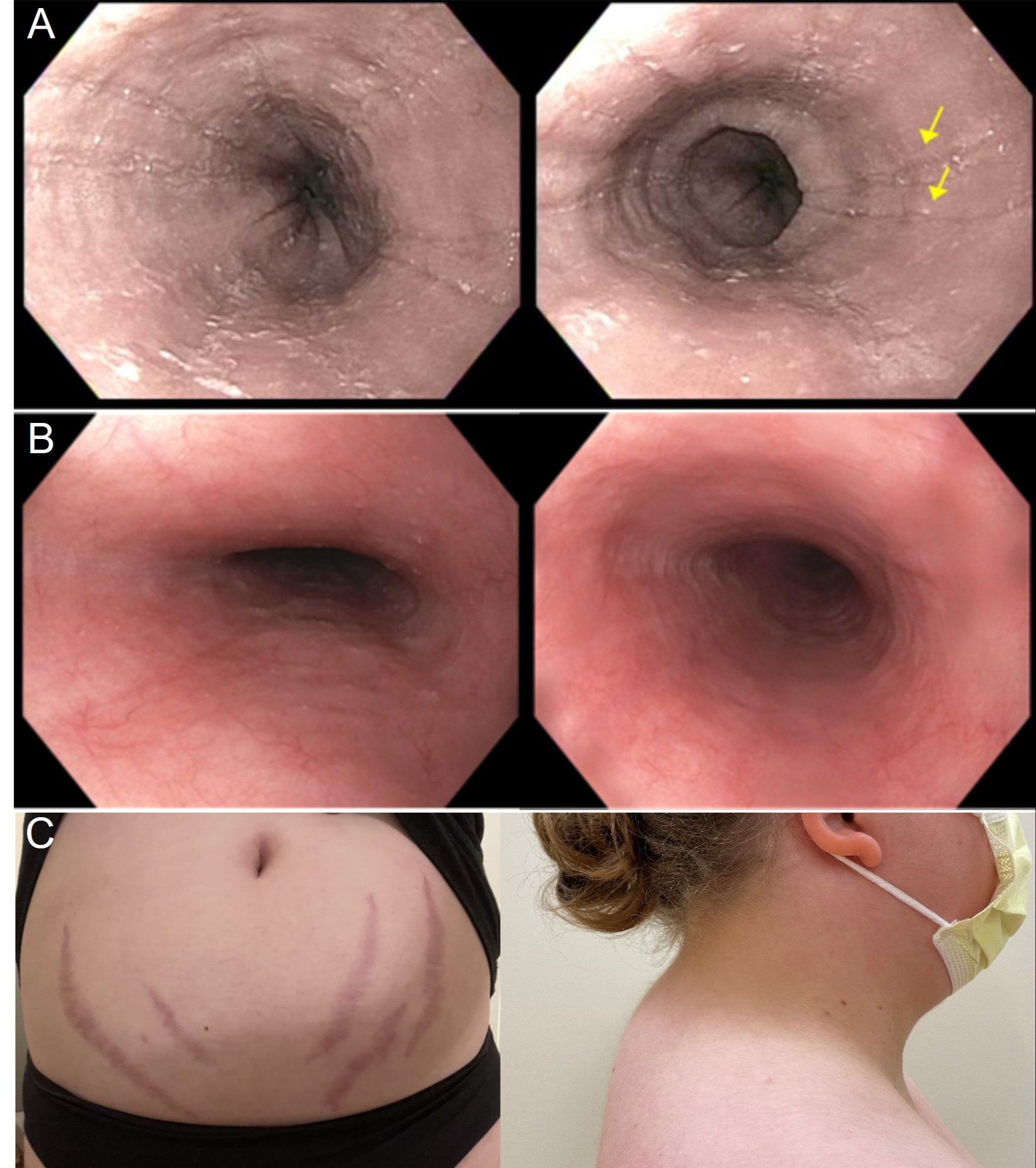Back
Poster Session A - Sunday Afternoon
A0241 - Iatrogenic Cushing’s Syndrome in Eosinophilic Esophagitis: A Rare Complication of Swallowed Topical Corticosteroids
Sunday, October 23, 2022
5:00 PM – 7:00 PM ET
Location: Crown Ballroom
.jpg)
Joy W. Chang, MD, MS
University of Michigan Medicine
Ann Arbor, MI
Presenting Author(s)
A. Hannah Fagen, BS1, Michelle Russin, MD2, Joy W. Chang, MD, MS2
1University of Michigan School of Medicine, Ann Arbor, MI; 2University of Michigan Medicine, Ann Arbor, MI
Introduction: Topical corticosteroids (TCS) are a first-line treatment for eosinophilic esophagitis (EoE), effective at inducing and maintaining disease remission and well-tolerated with uncommon medication-related adverse events. Despite the theoretical risk of adrenal suppression (AS) with prolonged TCS use, data supporting clinically significant adrenal insufficiency in EoE are lacking and the risk of this rare complication is thought to be low. We present a case of iatrogenic Cushing’s syndrome associated with chronic TCS therapy in EoE and an opportunity for steroid-sparing treatment.
Case Description/Methods: A 27-year-old woman with a seven-year history of EoE refractory to proton pump inhibitor, 6-food elimination diet, and swallowed fluticasone (FP) achieved disease remission with high-dose oral viscous budesonide (OVB) 4mg. Rapid recurrence of dysphagia, endoscopic findings, and esophageal eosinophilia occurred with lower OVB doses. After FP use for five years and transitioning to OVB for 18 months, she developed cushingoid features including prominent pathologic striae on the abdomen, breasts, and thighs, facial rounding, supraclavicular fullness, central obesity, and a dorsocervical hump. Given known exposure to exogenous steroids, features consistent with iatrogenic Cushing’s syndrome, and assumed hypothalamic-pituitary-adrenal axis (HPAA) suppression, the patient began a taper of OVB and steroid-sparing treatment was initiated with dupilumab 300mg weekly. After tapering OVB to 2mg daily over two months, assessment (ACTH, morning cortisol, 24-hour urine cortisol) was normal, consistent with HPAA recovery.
Discussion: Topical steroids such as OVB are commonly used and recommended for long-term management of EoE with rare reports of adrenal insufficiency. As data supporting biochemical AS with TCS use in EoE is limited to observational studies with heterogenous testing for AI and lack of symptom assessment, the risk of clinically relevant AS is likely low. However, our case demonstrates that despite the favorable pharmacokinetics, systemic effects of TCS may be understated, particularly with high compliance and prolonged use of high daily doses. Clinicians should counsel patients on the non-negligible risk of AS when prescribing TCS for EoE, and consider assessment of the adrenal axis or use of steroid-sparing agents in those reliant on chronic TCS for disease control.

Disclosures:
A. Hannah Fagen, BS1, Michelle Russin, MD2, Joy W. Chang, MD, MS2. A0241 - Iatrogenic Cushing’s Syndrome in Eosinophilic Esophagitis: A Rare Complication of Swallowed Topical Corticosteroids, ACG 2022 Annual Scientific Meeting Abstracts. Charlotte, NC: American College of Gastroenterology.
1University of Michigan School of Medicine, Ann Arbor, MI; 2University of Michigan Medicine, Ann Arbor, MI
Introduction: Topical corticosteroids (TCS) are a first-line treatment for eosinophilic esophagitis (EoE), effective at inducing and maintaining disease remission and well-tolerated with uncommon medication-related adverse events. Despite the theoretical risk of adrenal suppression (AS) with prolonged TCS use, data supporting clinically significant adrenal insufficiency in EoE are lacking and the risk of this rare complication is thought to be low. We present a case of iatrogenic Cushing’s syndrome associated with chronic TCS therapy in EoE and an opportunity for steroid-sparing treatment.
Case Description/Methods: A 27-year-old woman with a seven-year history of EoE refractory to proton pump inhibitor, 6-food elimination diet, and swallowed fluticasone (FP) achieved disease remission with high-dose oral viscous budesonide (OVB) 4mg. Rapid recurrence of dysphagia, endoscopic findings, and esophageal eosinophilia occurred with lower OVB doses. After FP use for five years and transitioning to OVB for 18 months, she developed cushingoid features including prominent pathologic striae on the abdomen, breasts, and thighs, facial rounding, supraclavicular fullness, central obesity, and a dorsocervical hump. Given known exposure to exogenous steroids, features consistent with iatrogenic Cushing’s syndrome, and assumed hypothalamic-pituitary-adrenal axis (HPAA) suppression, the patient began a taper of OVB and steroid-sparing treatment was initiated with dupilumab 300mg weekly. After tapering OVB to 2mg daily over two months, assessment (ACTH, morning cortisol, 24-hour urine cortisol) was normal, consistent with HPAA recovery.
Discussion: Topical steroids such as OVB are commonly used and recommended for long-term management of EoE with rare reports of adrenal insufficiency. As data supporting biochemical AS with TCS use in EoE is limited to observational studies with heterogenous testing for AI and lack of symptom assessment, the risk of clinically relevant AS is likely low. However, our case demonstrates that despite the favorable pharmacokinetics, systemic effects of TCS may be understated, particularly with high compliance and prolonged use of high daily doses. Clinicians should counsel patients on the non-negligible risk of AS when prescribing TCS for EoE, and consider assessment of the adrenal axis or use of steroid-sparing agents in those reliant on chronic TCS for disease control.

Figure: FIGURE 1. Endoscopic evidence of (B) active disease on FP (B) disease remission on OVB 4mg daily; (C) Cushingoid features of abdominal striae and dorsocervical hump.
Disclosures:
A. Hannah Fagen indicated no relevant financial relationships.
Michelle Russin indicated no relevant financial relationships.
Joy Chang: Lucid Diagnostics – Consultant. Regeneron-Sanofi – Consultant. Takeda – Consultant.
A. Hannah Fagen, BS1, Michelle Russin, MD2, Joy W. Chang, MD, MS2. A0241 - Iatrogenic Cushing’s Syndrome in Eosinophilic Esophagitis: A Rare Complication of Swallowed Topical Corticosteroids, ACG 2022 Annual Scientific Meeting Abstracts. Charlotte, NC: American College of Gastroenterology.

